 If you caught this yesterday, my sermon text for Sunday is Galatians 4:8-20. A text that reveals Paul’s heart for the Galatian house churches and his perplexity (v. 20) over why the Gentile Galatians would even consider adopting—even more so, getting circumcised and identifying with--the Law and, thus, old age, living in exile, under the covenant curse Israel current position before God? Breaks his heart (as this text reveals). In this section, Paul also tells the Galatian house churches what his goal is. This is found in verse: “my little children, for whom I am again in the anguish of childbirth until Christ is formed in you!” (V. 19). Most English readers take the “you” as “you individuality,” assuming Paul means “I desire to see each Christian looking like, acting like Jesus.” While this is a good thing of course—and would be if that’s what Paul meant here. But it begs the question: What does looking like and acting like Jesus look like? And, is Paul referring to the individual Christian? Here in this text, not only is the “you” plural, it is a part of a prepositional phrase: ἐν ὑμῖν (“among you,” i.e., among you, the house churches in Galatia). So, Paul is saying, “My little children [those whom I led to Christian among the house churches in Galatia], for whom I am again in the anguish of childbirth until Messiah is formed among you.” It is so much more preferable to take the “in” (of most English translations] as “among,” a perfectly reasonable rendering of what Paul wrote. Now we should ask what does Paul mean by formed “among” the house churches in Galatia? The apostle has already told us in chapter 3. “For as many of you as were baptized into Christ have put on Christ. There is neither Jew nor Greek, there is neither slave nor free, there is no male and female, for you are all one in Christ Jesus” (vv. 27-28). Since the Law has fulfilled its purpose (which is why it was temporary and why it is so perplexing you--Galatian, Gentile Christians--would even consider circumcising yourselves to this Law), additionally, you all have been baptized into Christ, listen, and now there is neither Jew nor Gentile; there is neither slave nor free; there is neither male nor female—you all are in Christ and you all are Abraham’s offspring, heirs according to the promise [given to Abraham].” This is what is means to have Christ formed among them, namely churches that present “neither Jew nor Greek, there is neither slave nor free, there is no male and female” (3:28); house churches where “you are all one in Christ Jesus” (v. 28d). This observation makes me think that when our churches are majority peer-like congregations, I wonder if we are then returning to the elementary principles that govern the world—or, as Paul says in our text, we have returned to idol-worship.
0 Comments
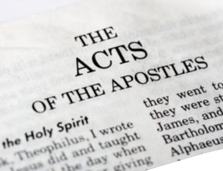 I have always been drawn to missionary stories. As a young Christian, it seemed, I read one or two a month. At that time, I thought I’d be somewhere overseas . . . ending up in some prison somewhere or in an unmarked grave in some distant jungle. I prayed, often—really, all the time—“Here I am! Send me.” [Which is, by the way, part of our text this morning, if you take the immediate context of the original OT Isaiah 6 quote in our Acts 28 text seriously--well, I certainly do). I prayed, “Send me.” God never did. Over there, anyway, to some distant shore or jungle. Didn’t have the privilege to reach the unreached, somewhere difficult, somewhere dangerous for the Lord. Until—until God, surprisingly, late in life, called me to the Hill. Sure. Not a foreign field. But a mission-field, nonetheless. Perhaps even more difficult in some ways—and at times, as dangerous. Early Wednesday mornings, Dr. Doug Bruce (an elder of CPC New Haven, our anchor church) and I would walk around the Hill talking and praying before he went to his office at the Hill Health Center. On one walk he told me he had been on the foreign mission-field and added, “What you have here in the Hill is just as, if not more, difficult as any mission field overseas.” Recently I have picked back up reading missionary biographies. In particular two have impacted me: John Paton, missionary to head-hunters of the South Pacific, and Amy Carmichael, missionary to orphans and the unclean of Southern India. John Paton (late 1800s) was a Presbyterian missionary to the New Hebrides headhunters of the South Pacific islands. Once Paton dared one of the chief priests to prove their gods by placing a death curse on him. The failure of their curse brought support for his ministry from some; murderous ambushes from others. Paton’s story (and it didn’t hurt that he was Presbyterian!)—his story was encouraging to me because it was impossible . . . headhunters, lost in time, ruthless, godless, some of the worst on the known planet. As I read Paton’s autobiography, I could not help but hear Paul’s words in 2 Timothy 2:10: “Therefore I endure everything for the sake of the elect, that they also may obtain the salvation that is in Christ Jesus with eternal glory.” [Written in Rome by the way, where our Acts 28 scene takes place. Not a coincidence.] Then, there is Amy Carmichael, died in 1951, who opened an orphanage and founded a mission in Southern India . . . and she hated fundraising . . . well-known for hating it too. She refused to paint a successful picture for her patrons, eschewed hitting all the sweet spots in telling stories that would provoke her supporters to continue giving. Someone eventually talked her into doing some support-raising and when she did, she said: “. . . we have tried to tell you the truth—the uninteresting, unromantic truth . . . The work is not a pretty thing, to be looked at and admired. It is a fight. And battlefields are not beautiful.” So, you’re finishing up the Acts of the Apostles. Now you know the story well, maybe even excited by it, motivated . . . we admire it . . . we want that! As David Wells of Gordon-Conwell Theological Seminary once wrote about the Acts of the Apostle: “We are impressed . . . impressed at how the disciples got the job done . . . we see the awe, we feel the coming of that power like a tidal wave sweeping all before it . . . If only our times were like theirs . . . They were accused of turning the world upside-down . . .” We want that! Yet, let’s not get sucked into admiring the scenes and stories in Acts . . . it . . . using Amy Carmichael’s words . . . it isn’t pretty, not a thing to be looked at and admired. Luke didn’t hold back, didn’t paint a rosy picture. He has presented a battlefield and a battlefield is not pretty. It is an impossible task. It is messy. It is dangerous. So, at the end of Acts, we have Paul in Rome. What happens to him afterwards, we simple do not know. Only guesses. Did he eventually make it to Spain? We know he wanted to from his Letter to the house churches in Rome. Was he eventually executed? We do not know. What we do know is how Luke chose to end his 2nd volume—he could have chosen any ending . . . Paul standing before Caesar would have been very cool. But this is his finale: a scene where some believe, some disbelieve, there is an Old Testament quote of judgment, a turn to the dirty, rotten-goiim—Gentiles—and, those last words: Paul “. . . welcomed all who came to him, proclaiming the kingdom of God and teaching about the Lord Jesus Christ with all boldness [openness] and without hindrance” (28:30-31). All openness and without hinderance. Through our text—the final scene in Acts—I’d like to ask: what does Luke want us to know as he closes his second volume known to us as the Acts of the Apostles? I. Luke wants us to know that we carry on Jesus’s ministry--he ends where Jesus ends in the Gospel of Luke II. Luke wants us to know some will believe and some will disbelieve III. Luke wants us to be clear on the purpose of Acts: All boldness and without hindrance So, we begin with Paul in some rented quarters somewhere in Rome—a place where Jews and Gentiles would have easier access to Paul at the same time. Probably some apartment near the West Bank of the Tiber River. This would have made sense. We can’t say for sure, but this would have been a logical and reasonable place—where we know most of the Rome house churches were and the place where Jews and Gentiles mingled a little more openly in Rome. This would have been the entrance place for most immigrating to Rome, filled with relocating Jews, barbarians (i.e., non-Romans and non-Greeks), and the poorest of Rome. Paul was awaiting trial, to stand before Caesar. He was under house arrest, but wasted no time. He “. . . called together the local leaders of the Jews, and when they had gathered, he said to them . . . I was compelled to appeal to Caesar . . . For this reason . . . I have asked to see you and speak with you, since it is because of the hope of Israel that I am wearing this chain . . .” (vv. 17, 20). So, what does Luke want us to know through his carefully crafted, to the point, and a little mysterious final scene in his Acts of the Apostles?  I. Luke wants us to know that we carry on Jesus’s ministry: We shouldn’t miss the link between Luke’s ending here in Acts 28 and the end of Luke’s Gospel and, as well, the beginning of Luke’s Acts of the Apostles: Here at the end of Acts: When they had appointed a day for [Paul], they came to him at his lodging in greater numbers. From morning till evening he expounded to them, testifying to the kingdom of God and trying to convince them about Jesus both from the Law of Moses and from the Prophets [Just as Jesus did at the end of Luke’s Gospel] Now recall the end of Luke (24:44-46): Then [Jesus] said to them, “These are my words that I spoke to you while I was still with you, that everything written about me in the Law of Moses and the Prophets and the Psalms must be fulfilled.” [It is like Luke is, at the end of Acts, saying, “Look, see it’s been fulfilled . . . but now carry on with the fulfillment.” And to make the link even more obvious—Luke bookends Acts with “the kingdom of God” (1:3): “[Jesus] presented himself alive to them after his suffering by many proofs, appearing to them during forty days and speaking about the kingdom of God.” Remember what we just read from Acts 28: Paul kept testifying to the kingdom of God. Here we have it, Luke’s ending, a deliberate crafting of a scene to bring the listener/reader full circle back to the beginning . . . it is where Luke began . . . and where Jesus ended in Luke and in Acts 1. You see Acts (hopefully I’m not ruining what you’ve learned from your pastors in this series on Acts)—Acts isn’t just about embedding Christianity in history (like it’s a history book of sorts), not at all, more so, embedding history in the unfolding and unstoppable inauguration of the Kingdom of God . . . Luke’s 2nd volume, Acts as a whole—this is what it looks like for Jesus to be raised from the dead; this is what it looks like for Jesus to be ascended to heaven: impossible and unstoppable. This is the work Jesus began to do and teach (Acts 1). . . we are faithful to the kingdom of God when we continue in this work, work that Jesus began to do . . . and what is this work? This work is the unfolding and spreading of the gospel—geographically and culturally . . . that’s what Acts presents and that is exactly how Luke ends his second volume. Geographically, this is Luke’s obvious outline—(back in 1:8) witnesses in Jerusalem, then Samaria, and then the ends of the earth—here in Rome at the end of Acts, but probably “ends of the earth,” biblically, are the nations . . . and that is what we have here in Luke’s second volume . . . what Jesus began (i.e., the first volume, his Gospel), now unleashed by the ascension of Jesus and the coming of the Spirit—and it’s probably why Paul is left alive in the narrative and most certainly why Luke closes with Paul turning to the gentiles, welcoming “all who came to him, proclaiming the kingdom of God and teaching about the Lord Jesus Christ with all boldness and without hindrance.” With all boldness (openness, a better word) . . . all openness and unhindered. But also, culturally. Jew-Gentile. Obviously a theme throughout the New Testament, but in Acts it is THE movement in the narrative—and this is how Luke ends: some Jews believing, some disbelieving, and the Gentiles listening. Amazing. Some Jews believed and this would have placed them amid Gentiles turning to the faith . . . this is in the background here . . . a mingling of two polar opposite ethnicities becoming family but it would have been crazy for Jews to be fellowshipping with Gentiles . . . that’s what got them in trouble with God in the first place . . . reputations would have been ruined, marked as unclean, banned from synagogue and temple . . . destroyed families, made children orphaned from the community . . . put family and friends at risk . . . there is something on the ground here, and not just theologically . . . a real mess . . . a not so pretty battlefield for believing Jews . . . but there is even more ethic diversity among the bigger category of Gentiles, including class, females, slaves and legacy families, even children . . . a mix that would have been even more culturally crazy . . . As Paul puts it in Romans (in Rome!): Greeks, barbarians, the wise and the foolish (1:14) . . . these are demographic categories similar to how we use demographics today: the reference to “Greeks” rather than “Gentiles” for Paul in his Letter to the house churches in Rome points to elite-Greeks (the cultural somebodies of Paul’s day and in real tension with those who were Romans—Greeks were the original Latins), not simply Gentiles in a general sense: barbarians point to immigrants, non-Romans, slaves from all over the empire, and any non-citizen, including Jews . . . and the wise and foolish are the educated and the uneducated (literally the haves and have-nots of Paul's day). This is actually the movement Luke presents to us—this is what we, the church, CPC in The Hill, CPC Fairfield, are caught up in . . . this movement of the Spirit that extends to all people, to crossing every cultural and social barrier . . . from the Samaritans (half Jew-half Gentile) to the first recorded individual conversion in Acts, the Ethiopian Eunuch to some Athenians to the conversion of Cornelius . . . to the Roman jailor and his household . . . and at the end, this is where Luke leaves his story with for us to hear . . . the last word: Continue to do this work that Jesus began . . . 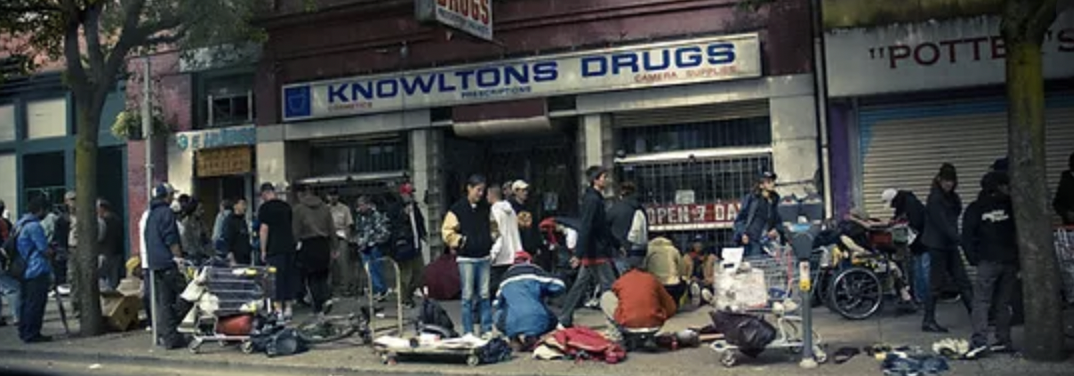 II. Luke wants us to know some will believe and some will disbelieve: Let’s hear the text again: And some were convinced by what he said, but others disbelieved. And disagreeing among themselves, they departed after Paul had made one statement: “The Holy Spirit was right in saying to your fathers through Isaiah the prophet: “‘Go to this people, and say, “You will indeed hear but never understand, and you will indeed see but never perceive.” For this people’s heart has grown dull, and with their ears they can barely hear, and their eyes they have closed; lest they should see with their eyes and hear with their ears and understand with their heart and turn, and I would heal them.’ Therefore let it be known to you that this salvation of God has been sent to the Gentiles; they will listen.” Interestingly, the opposite of the Isaiah quote. The Isaiah quote is a idol-taunt, that is, the people of Israel had begun to act like the nations around them and, thus, could no-longer hear God’s voice, hear His word--they had ears but could not hear. Yet, now, in the preaching of the gospel, Gentiles hear! It is the twist in this movement. It is the narrative application we are to hear. Now, Pastor Chip, that’s pretty obvious: some will believe and some will disbelieve . . . yet, that’s not the obvious Luke is after; but, it’s the mission we are to hear, the gospel movement itself, the increase, the gospel’s spread, if you will . . . this is what the church needed to know, needed to accept and deal with, and it—some will believe, some disbelieve—teaches us what our role as church is . . . that the word of the gospel is a word of judgment that exposes our hearts and is also the very means of grace that can save us, save your neighbors, save those in the Hill, save those in Fairfield: some will believe and some will disbelieve. Paul’s use of Isaiah 6 to summarize or “proof text” the gospel, if you will, is to draw the church’s attention to the fact of Hard and Idolatrous Hearts . . . we all, every one of us, everyone we encounter in life, everyone we engage with the testimony of our life as a Christian, everyone we share our faith with has a hard heart and is full of idolatries—everyone. A hard heart and full of idolatries. And this is what Jesus began to do . . . recall his use of Isaiah 6 (Matthew 13; Mark 4) to explain why some didn’t respond to the parables and some did: Luke wants our testimony to imitate Jesus . . . . Paul’s sure did . . . and this has been the story of Acts. This is what it means for Jesus to be ascended to heaven and the gospel to be unleashed to the ends of the earth . . . we cannot control it (the gospel), but it is still unstoppable . . . and it is the only thing—the gospel, the sharing (28:31) of the kingdom of God and teaching about the Lord Jesus Christ—that will effectively call God's elect, who have hard and idolatrous hearts. Isaiah 6 is a full text, one of the top five most quoted OT texts in the NT. Isaiah 6 is the gospel in Old Testament language or better, the gospel is the fulfillment of Isaiah 6. The word of the gospel is a word of judgment that exposes our hearts (as does Isaiah 6) and also a means of grace for repentance (also, what Isaiah 6 does as well). Paul (really Luke) isn’t using the Isaiah 6 taunt just to explain why some will believe and some will disbelieve. It is used to say it is out of Paul’s hands, out of our hands . . . but it—the gospel—is the only thing that can change hard hearts full of idolatries (the impossible) so that it may increase, spread, demographically and geographically (the mission). Let’s pause for a second to fathom what we have been called, instructed, commanded to do here. Paul’s use (well, Luke’s record of) Isaiah 6 is the only time that the introduction to the taunt is used. This implies to me that Luke has a slant, a nuance—the other times, as Jesus used the reference in the gospel, it was about the audience, the hearers, why their hearts were hard, why they didn’t respond . . . here however, we get the command: Go and say: “Go to this people, and say, “You will indeed hear but never understand . . .” Not just an explanation but also a command—not just an explanation as to why people have heart hearts; but a command to go speak to hard hearts. This tells me that we are to infer that Luke is (narratively, with the whole story actually, in summary here in Acts 28) telling us to speak to hard hearts—speak to impossible and messy idolatrous hearts. That’s why George Paton could go to the headhunters and Amy Carmichael could be realistic about the messy battlefield . . . that’s why we go do the impossible in the Hill and right here in Fairfield. This is where we say, “Send me!”  III. Luke wants us to be clear on the purpose of Acts: All boldness and without hindrance: It would be unfair to review all of Acts here—but still this is what Luke is actually doing with his conclusion to his second volume (our text). He is drawing us to all his hints along the way, the movement, the spread of the gospel with impossible odds . . . even with one of the heroes of the story not having done the big thing . . . You’d have thought the big ending would be Paul before Caesar. That has been, narratively speaking, plot-wise, what the reader has been moving toward. But still, we . . . were . . . given some hints that Paul’s tack toward appealing before Caesar was off a little . . . even with warnings not to do it, yet still Paul uses his bought and paid for Roman citizenship to appeal to Caesar . . . (whether Paul was right or wrong isn’t really Luke’s concern, but that it happened and fits his inspired purpose for writing) . . . we travel with Paul through danger, ship wretch, and imprisonment all the way to Rome for that final show down, Paul vs. Caesar . . . this will be so cool, we think, anticipating that final scene . . . this is great American film-making! Paul’s journey is not unlike Luke’s portrayal of Jesus heading to Jerusalem to be put to death. We’re all prepped for Paul to stand before Caesar . . . but no . . . wait . . . what? That’s not what happens. This is not the ending we were prepared for . . . it is a letdown . . . we didn’t get what we paid for . . . not a word about Paul and Caesar . . . we are left with: He lived there two whole years at his own expense, and welcomed all who came to him, proclaiming the kingdom of God and teaching about the Lord Jesus Christ with all boldness and without hindrance (Acts 28:30-31) What we are left with is a scene that summarizes what Luke has been narrating all along . . . the movement and spread of the gospel—culturally, Jew-Gentile and geographically (finally in Rome) . . . This is it: the message is what’s important and what was unleashed when Jesus ascended to heaven and the Spirit was poured out on His church continues . . . the apostle Paul left in rented quarters, no indication of his big day before Caesar. We are left with simply with what Luke has been driving at all along and throughout his story: the gospel is the Big Thing . . . the unstoppable increase of the gospel. We see this “increase,” this movement all along—there are references in Luke’s narrative, that, at impossible moments the word of the gospel increases. Luke connects the end of his story to the progression he has embedded throughout his narrative in Acts.
A clear repetition that is meant to reenforce the obvious geographic and cultural movement of Luke’s purpose and message: at pivotal points in the story where the gospel and the fledgling church were in danger, under some form of threat, we hear that the word of God (the gospel) or the church increases. The story goes: there is fellowship issues among the clashing cultural members of the church (Acts 6); there is a hindrance in getting the gospel to the Gentiles: the zealous, Christian murdering Saul. But here God converts this enemy of the Church, making him the very instrument that would bring the Gospel to the Gentiles (again affirmed by Luke’s ending in chapter 28). But, again, hindrance occurs when the Church doesn’t want Gentiles, outsiders, to receive full fellowship. But, God converts Cornelius in a mighty wind and the mission to the Gentiles is off and running (Acts 10). Then Paul and Barnabas, the two great church planters, are split up because of personal conflicts. But the mission does not stop! Kill a few. Jail them. Beat them. Divide them. But, this is God’s thing—nothing will stop it. Salvation is for all people, to the ends of the earth. The Gospel will not be ultimately hindered. So what should we walk away with by Luke’s story in light of his ending? What does this inspired ending of Luke’s account of the young church call us to do . . . to believe . . . to be obedient in following Jesus? What is our church to do? What do I want to leave with you in light of Luke’s final scene of his second volume? First—we can’t control history . . . no matter who we know, what power we think we have (even voting) or what platforms we have . . . or want to have (like standing before Caesar). We can’t control history. The recent COVID-19 shut down should have demonstrated this to us, we’re not in control of history. But, we are to believe what Luke has presented, namely, that God’s plan is unstoppable. Second, the church can handle—God can handle—whatever history throws at us . . . the church . . . the gospel will be unstoppable even when what we do is impossible, where we minister is impossible . . . I have been reading and rereading the Acts of the Apostles these past few weeks, while at the same time watching the images and listening to the stories coming out of Ukraine and of the Ukrainian church. This has made me think that the life of the church in Acts and the lives of its apostles and evangelicals and pastors are more like the life of the church in Ukraine (and recently, similarly, the church in Afghanistan) than the life of the American church as we experience today. Christians, churches, miss the unstoppable impossible missional task of God in Christ for we tend, like our culture, to seek the possible, the more likely to be successful, the least dangerous to us (personally or for our family). Luke’s Acts of the Apostles does not present such an option. Luke’s second volume, the Acts of the Apostles, presents a messy, impossible, and a dangerous story of the birth of the church, the geographic and cultural spread (increase) of the gospel, and the lives of those who participated in God’s missional task, the unfolding of the fulfilment of what God had promised. As Amy Carmichael said, God’s missional task “is not a pretty thing, to be looked at and admired. It is a fight. And battlefields are not beautiful.” This is what we choose to be caught up in. We choose to be a part, even a small part, of the unstoppable impossible (and potentially dangerous) missional task of the gospel. And, please if we are to hear the Acts as God’s word to us, we cannot escape that what we do as church is dangerous—that’s what Acts presents, a messy, dangerous battlefield. Continue Jesus's ministry, God’s unstoppable, impossible mission! Join Jesus's unstoppable, impossible mission! *I originally preached this sermon, as a guest in the pulpit, at Christ Presbyterian Church Fairfield in Fairfield, CT as the conclusion to their Sunday series through the Book of Acts. The sermon was also record (see below): some scrolling forward is necessary.
 First a sermon illustration to start us off: There is an old illustration of Hell that still speaks and I think it sets up my point from Luke 6:37-49: Hell is like a long banquet table with all sorts of food and delights, but everyone at that table is getting thiner, more gaunt, more haggard from hunger. They are starving with all that food before them. You see, the utensils they were given and had to use were six foot long chopsticks. If they’d only thought unselfishly and fed each other, no one would be starving and all would be enjoying the great banquet. Thus, the Adamic nature of the human-being and why the existence of Hell. Now, the point of the illustration, here, is the audience of Luke’s Gospel, the listeners/readers before the text, that is, those house-churches (associated with Theophilus) with believers sitting around those tables enjoying a meal (aka breaking bread) and lifting that fourth cup of wine at the end of the supper, celebrating together and acknowledging that Jesus is Savior and King. And us, now . . . Still, for now, imagine those tables with former enemies and individuals of clashing social status all confessing Jesus is Lord, a new fellowship of unequals and strangers. Love your enemies and stop judging makes applicable, narrative sense (Luke 6:27, 37). It makes church sense. So, let’s take a look at the text and context, beginning with Luke 6:37-38a: “Judge not, and you will not be judged; condemn not, and you will not be condemned; forgive, and you will be forgiven; give, and it will be given to you” What do we have here? There is an obvious structure that helps us read it properly:
This whole pericope (i.e., set of commands) should be taken as one thing. Yet, still there are questions begged to be asked . . . ➤ Stop judging what? And, what will we be not judged of? ➤ Stop condemning what? And, what will we be not condemned of? ➤ Forgive [others] of what? And, what will we be forgiven of? These are all left open-ended, unanswered by the command and promise. Most supply don’t judge sin in others and sin will not be judged of you . . . forgive others of sin and sin will be forgiven you. We might infer this, but the sentences do not demand or necessarily imply this reading. Now, the last command . . . ➤ But . . . the “give” is already in the context and, thus, can be applied to the whole: “Give to everyone who begs [“borrows” is a far better reading] from you, and from one who takes away your goods do not demand them back” (Luke 6:30); “And if you lend to those from whom you expect to receive, what credit is that to you? Even sinners lend to sinners, to get back the same amount. But love your enemies, and do good, and lend, expecting nothing in return . . .” (vv. 34-35). So, how does this help us with reading and applying this element of the Sermon on the Plain? Pretty much most see the judging and condemning related, as I mentioned, to sin--you know, don’t judge the sins in others (i.e., the specs) before you deal with the sins in you (i.e., the logs/beams). Nothing in the text nor the context warrants this reading. However, something else is within range. Let me suggest: there is a social and cultural association/relationship implied that I believe we can reasonably and appropriately infer. We have the “poor” and the “rich” already referenced in the Beatitudes (vv. 20-26) and there are the references to “enemies” (v. 27b), “those who hate you” (v. 27c), “those who curse you” (v. 28b), “those who abuse you” (v. 28b), “the one who strikes you on the cheek” (v. 29a) and “the one who takes away your cloak” (v. 29b), including “the one who begs from you” (v. 30a) and the “one who takes away from you” (v. 30b), and, especially, there is the patronage giving-lending-for-return (vv. 32-35)–all pointing to social and cultural castes of relationships (very much the poor/rich referents mentioned in the Beatitudes). . . this “giving” et al. idea is drawn into this set of instructions (as already pointed out above), which, based on how the instructions is structured, infers to the whole (all of the commands). Simply: stop judging-stop-condemning-start forgiving-start giving is an extension of “love your enemies . . . do good to those who hate you, which leads to the give/lend expecting nothing in return.” Seriously, this reading actually solves the “poor” and the “rich” referents . . . and supplies how it is the “poor” and the “rich” are now breaking bread together as members of the family of God (around those tables). There is a social and cultural shift amid the new community of God in Christ Jesus around those tables—something both attitudinally (i.e., renewed in mind) and concretely (i.e., a behavior, a lifestyle that is) different, wholly distinctive about this community of Jesus followers. There is something missionally different (and imperative) and something intrinsically different (relationally), even something ontologically unalike the social and cultural milieu (the social location, what makes the empire adhere and maintain, the tiers of human hierarchy) that surrounds the church–these congregations, these tables, these local, neighborhood house-churches are a new creation, unlike anything else now or before. Missionally important because this redemption in Christ is for all people—using Paul’s language in Romans 1, for the elite-Greek, barbarian, Jew, educated and uneducated; using Luke’s (i.e., Jesus’) the poor and the rich, the beggar/borrower and the lender. The message itself (i.e., the gospel), those to whom the message was to be shared (missional importance), and the new relationships at those tables need to match, align. Thus, enemies are also to be loved—out-there among those to whom this gospel would offend and threaten, these cultural enemies. First, all made visible at those tables of gathered Jesus followers (i.e., disciples). And, made outwardly relevant by doing the same among neighbors and in the community. Can’t reach and minister to those whom you are judging and condemning—and I take this to mean socially and culturally judging and condemning (given the narrative context) . . . and as such among the socially and culturally unacceptable* (read both ways—poor to rich, rich to poor) that we are to love, do good, forgive, lend, give) . . . and this gospel is made visible and real around those tables throughout the local house-churches. It seems, given the diversity at those tables and the new rules (if you will) of who can and should be at the table, there would indeed be a need to stop judging/condemning and a whole lot of forgiveness to go around and new patterns of giving to be had. There is no privilege (or patronage) at that table. There is no cursed at that table. Only new relationships in Christ. Given that the Sermon on the Plain ends with the house parable, which speaks to the actual house-church-settings (Paul uses the same in Ephesians 2) and is about discipleship, specially listening to (meaning, obeying) Jesus’ words—those who hear and does them—what I have proposed here seems a good, reasonable (exegetically, narratively, and contextually) faithful reading of the Luke text regarding “judging” et al. And, thus easily and significantly applied to our own church fellowships and witness (mission). *socially and culturally unacceptable are those in castes that are despised, shunned, hated, outside blood-lines, social groups, vocationally loathed, economically reviled, and religiously held in contempt (of which the Christians because of whom they follow and because of this new socially destructive teaching would also find themselves)--this can, nonetheless, be applied (i.e., done) reciprocally from one group/caste to the other and visa versa. Other Sermon on the Plain Wasted Blog thoughts
III. We demonstrate the presence of the Kingdom by sending Laborers into God’s Field to do what Jesus did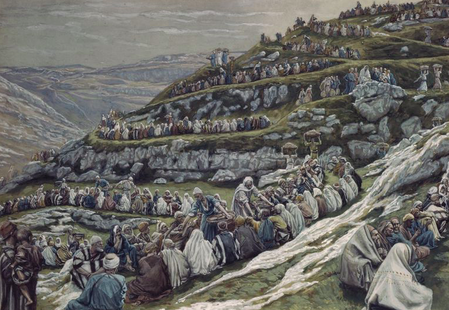 We have moved into the Hill. We relocated. (You all made this possible—thank you.) This is important: most pastors of churches in places like the Hill don’t live in the church’s neighborhood. Our moving into the Hill is a big deal—that’s what our neighbors tell, too. This is huge because there is a connection between the gospel and the community . . . between Shepherds and the community . . . between churches and the community. No wonder Jesus calls for laborers for the harvest. Another summary at the end of Matthew 9.
The reason for Jesus’ compassion is that they were sheep without a shepherd, harassed and dispirited. Jesus mixes his metaphors and says that there is a need for Shepherds for the Harvest is rip. “Harvest” is a great eschatological, end time word used throughout the Old Testament. “Harvest” means we are in the age of the appearance of the Kingdom of Heaven, but it also suggests that the end is near (of course eschatologically near, but also timely, the time to harvest is now; this gives us an urgent frame for the task). We should not be surprised that there is a relationship between this crowd of outsiders, unclean, lame, diseased, their condition (harassed and dispirited), and the absence of a Shepherd. People die without a shepherd. This is why we pray to the Lord of the Harvest to send forth laborers, send Shepherds into the field. I am humbled by how I am greeted on our apartment’s street: “Pastor.” “Rev.” “Park Pastor.” My favorite is “Hey, Preach.” But the one that honors me the most is when my neighbors call me, “Pastor of the Hill.” That’s crazy, right? I had just walked out of our apartment front door, heading to my car for a meeting, when I heard, “Pastor, come here.” This happens often. I do not carry cash on me. This is an important rule ministering where I pastor. Usually it is, “Do you have a dollar?” or “I need $8.50 for a bus ticket.” It’s hard, but I need to say, “No, I don’t.” Yet, I am a neighbor. And, a pastor (which most of our neighbors know) . . . so, sometimes I try to find other ways to help. This morning an older gentleman, who lives across the street (he admits his drinking problem and has a hard time walking because of his heart), pulled me in close and whispered to me, “Do you have a bag of groceries?” This is a tough one . . . I gave him my normal reply, but added, “When I get back, I’ll see what I can do to get you some food.” I located a $20 and found him still sitting where I left him. “Let’s go to the corner store and get you $20 bucks worth. No cigarettes though.” We walked slowly, stopping every 25 feet or so for him to catch his breath. Once inside the corner store . . . it was missional . . . a small crowd was there. Some teens shouted, “Hey, Pastor Chip!” I introduced myself to the others. Fist bumps all around. My older neighbor then surprised me when he started introducing me to his friends in the store, “This is my pastor.” Didn't expect that. And, he said it more than once. I held back tears. Of course, there are plenty of food resources, shelters, and food pantries in New Haven, which is my usual go-to reply. But, my presence in the neighborhood isn’t to be a social-worker or case-worker. This is a neighbor, someone I talk to regularly, and to whom I have given some street pastoral counseling—hard to just defer when, in some way, he’s one of my sheep (at least a street sheep). Plus, this man is abused by his boarding roommate, his food stamp-card taken regularly, and his landlord won’t do anything—and complaining just makes it harder on him. All this gentleman knows is his drinking, bad health, and sometimes Jesus shows up as his neighbor who also happens to be hispastor. These good people need a shepherd . . . It is no surprise that immediately after having compassion for the sheep that do not have a shepherd (9:36) and praying for the needed laborers to go harvest (9:337-38), Jesus appoints his twelve and commissions them (10:1-15). Although there is far more to this list (vv. 2-4) and their mission (vv. 5-15), I want to call attention to one thing very much related to our thread: Jesus instructs the twelve to proclaim that the Kingdom of Heaven is at hand (v. 7). Jesus calls the 12 disciples (10:1a) and gives them authority to do exactly what he has been doing (v. 1b)–exactly what they observed in following Jesus around as we have observed thus far. Now, they are to be fisher-followers by casting out demons and healing every disease and every affliction (10:1) and, so, they demonstrate that the kingdom of God is present (v. 7): Heal the sick, raise the dead, cleanse lepers, cast out demons (v. 8a). *This sermon was preached at Redeemer Presbyterian Church in Concord, MA on Sunday, May 19, 2019. The full sermon maybe downloaded as a PDF (here). An audio version is also be available >> Audio version Part I | Part II | Part III | Part IV
 The church at worship: “If there is to be a ‘committed people as the sign and agent and foretaste of what God intends, it can only be insofar as their [church’s] life is continually renewed through contact with God himself’ in worship . . . ‘True worship enables us [as church] to be conformed more and more inwardly to the Cross of Jesus.’ The cross of Jesus means a total and costly identification with the world [around us], on the one hand, and yet a radical separation from its idolatry, on the other. Worship renews us in this life of Jesus.” ~Michael W. Goheen, in his The Church and Its Vocation, as he reflects on Lesslie Newbigin's concept of God’s missional means of grace.
Almost all works on the relationship between evangelism and social action, most books on the church and the poor, and every book out there on the subject of Christians and social justice are argued from experience, a theological bent, a political aisle, or a church experience. Although such platforms have value and have their place, there are few, if any, volumes that seek an exegetical foundation for the author’s conclusion: a what does the text imply? My Wasted Evangelism is an exegetical argument for understanding that social action can be a component of biblical evangelism and ought to be an element in a church’s task of evangelism.
Please consider purchasing a copy of my Wasted Evangelism: Social Action and the Church's Task of Evangelism, a deep, exegetical read into the Gospel of Mark. All royalties go to support our church planting in the Hill community of New Haven, CT. The book and its e-formats can be found on Amazon, Barns'n Noble (and most other online book distributors) or directly through the publisher, Wipf & Stock directly. Here are some excepts from each of the chapters: Samples 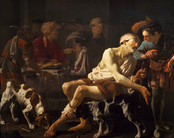 Been dwelling some in Luke’s parable of the Father, stay at home son, and the prodigal son. First, the trio-parable set in Luke 15 is not about our individual salvation nor a focus on simply the Father’s love for me--it is incredibly more and speaks loudly to the habits and the forming of church. We need to hear how, in fact, Luke starts chapter 15: “Now the tax collectors and sinners were all drawing near to hear him. And the Pharisees and the scribes grumbled, saying, ‘This man receives sinners and eats with them’ (vv. 1-2). So, the issue is pretty clear: The temple-leadership had a problem with Jesus’ welcoming of the unclean, marginal, socially unacceptable and despised to the table of fellowship. What is often overlooked in the wider context is that Luke’s chapter 15 set of parables is surrounded (preceded and followed) by “feasting” and “eating” lessons. (We’ll get to this in a moment.) Additionally, Luke’s three-parable set is also about “feasting” and “eating.” For in both the first two Luke 15 parables, after what was lost is found, there is a gathering of friends and neighbors for rejoicing: “And when he comes home, he calls together his friends and his neighbors, saying to them, ‘Rejoice with me, for I have found my sheep that was lost’” (v. 6). Likewise when the prodigal son returns, he is welcomed into a feast as the honored guest (vv. 24-27).
The wider narrative in Luke suggests that it is whom we invite to these “feasts” and times of “eating” that is at issue. For Luke 15 is bracketed by chapters/stories of "feasting" (i.e., "eating"). First, there is the parable about proper kingdom table etiquette (the inviting of the marginal and socially unacceptable) vs. the acceptable social norms (chapter 14) and, then in the preceding chapter, the story of a rich man, who “feasted sumptuously” and poor Lazarus, “who desired to be fed with what fell from the rich man's table” (16:20-21). The lost-dead-prodigal-son isn’t just a picture of the wayward sinner, the lost law-breaker, but is a figure representing--to keep with Luke's theme--the socially unacceptable that are now welcome, equally, without hesitation or qualification (save faith) to God’s kingdom table. These parables, including Luke 15's parable of the prodigal son, are forming for church and missional church-life. Luke 15 is one of the parables that scream out: “Go do likewise!” Who are you eating with? Who are you intentionally inviting and compelling to come be a part of your local church? Maybe even more so, who are you making second class citizens of the kingdom by how we do church? 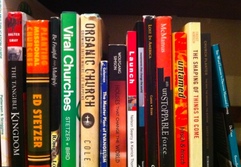 Brad Brisco has put together a good list of Missional church related books. Additionally he includes a four-part series of blogs that will help us understand the term and use of “missional.” A number of the books on the list I have read--some I need to. From his list, here is a few I can highly recommend. If you are a church planter, concerned about evangelism and missions in the local church, these will feed your soul: Missional Church: A Vision for the Sending of the Church in North America by Lois Barrett and Darrell Guder Missional Essentials by Brad Brisco and Lance Ford The Great Giveaway: Reclaiming the Mission of the Church from Big Business, Parachurch Organizations, Psychotherapy, Consumer Capitalism, and Other Modern Maladies by David Fitch ReJesus: A Wild Messiah for a Missional Church by Michael Frost and Alan Hirsch Exiles: Living Missionally in a Post-Christian Culture by Michael Frost The Church Between Gospel and Culture: The Emerging Mission in North America by George Hunsberger, and Craig Van Gelder Misisonal: Joining God in the Neighborhood by Alan Roxburgh Slow Church: Cultivating Community in the Patient Way of Jesus by Smith, Christopher Smith and John Pattison Confident Witness – Changing World: Rediscovering the Gospel in North America by Craig Van Gelder The Ministry of the Missional Church: A Community Led by the Spirit by Craig Van Gelder
|
AuthorChip M. Anderson, advocate for biblical social action; pastor of an urban church plant in the Hill neighborhood of New Haven, CT; husband, father, author, former Greek & NT professor; and, 19 years involved with social action. Archives
February 2024
Categories
All
|
||||||||||||||||||||||||||||||
Pages |
More Pages |
|
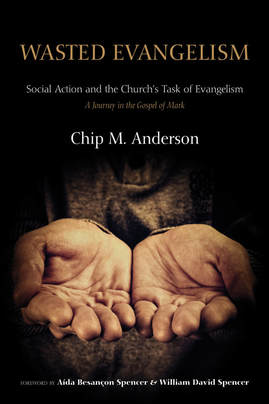
 RSS Feed
RSS Feed